This book has become a sort of bible for marketers and everyone under the sun recommends that you read it. The reason being it's very good at explaining the psychological principles of why people do things in a way that's easy for the layman to understand. The cool thing about these principles is you can also apply them to your paid advertising strategy, specifically your landing pages.
In Influence, Robert outlines 6 different persuasion principles that marketers, salesmen, and even con men use to get people to do what they want.
Those 6 principles are:
- Reciprocity
- Commitment (and Consistency)
- Social Proof
- Liking
- Authority
- Scarcity
These 6 principles can be used on your landing pages to see better results.
Read more below.
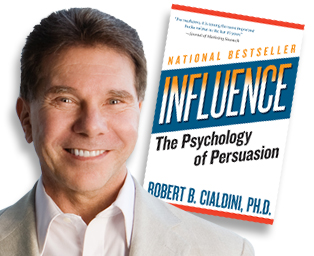
Persuasion Principle #1: Liking
It goes without saying that people are more likely to do business with someone they like.
So ask yourself…
Do your prospects like you? Do they like your brand?
Now, face-to-face, it's easy to know whether or not we like someone. Based on their body language, tone of voice and the overall vibe we get from them, we develop instant judgements with whether or not we want to associate with this person or buy their product.
However, how can you get someone to like you if you've never met them in person and are selling through the internet, not face to face?
Here are two ways to take that face to face interaction and integrate it with your online marketing:
#1: Entertainment
Give people an entertaining/funny video or something fun to read.
You'll put them in a good mood and they'll lower their defenses.
Example: DollarShaveClub.com
The Dollar Shave Club sells a monthly subscription for razor blades They had a funny sales video go viral a few years back…
And they're still using that same video on their landing page to this day.
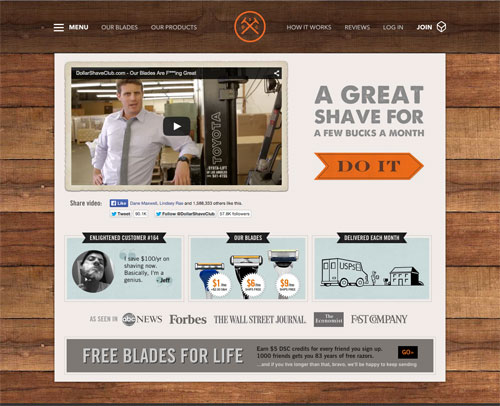
You can't watch the video and help but laugh. The video shows that they're a cool, fun company who also offers great service for a great price. You want to buy razor blades from them because you enjoy their marketing.
#2: Bring it down to Earth.
Drop the corporate speak and chat with your prospects like you would with your closest friend.
Being informal and being “just like them” is a very powerful strategy. It shows you're not some big CEO trying to extract a few dollars from their wallet, but rather a real person who wants to help them.
Example: ILovePanicAttacks.com
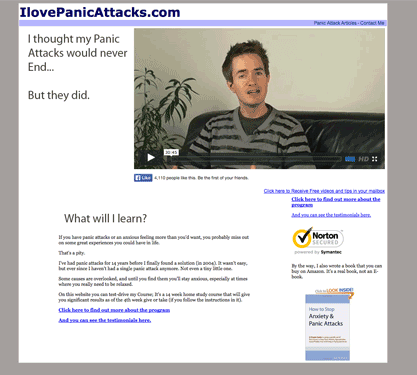
The video on this page very casual, like he's there talking to you in person. It's not particularly high quality and the guy is dressed kind of frumpy. Yet, this lends even more credibility because it feels like it's just some guy in his living room recording a video that helps people with their panic attacks.
People trust and like this guy because he understands what it's like to be in their shoes.
“I want to help you because I remember what it was like to suffer.”
Persuasion Principle #2: Authority

Persuasion Principle #3: Scarcity
“Because what’s worse than knowing you want something, besides knowing you can never have it?”- James Patterson
In life, love and business… people always want what they can't have and will often go to extremes to get it.
Scarcity in your marketing can be VERY powerful if you use it the right way
The wrong way to use it (how most marketers do) is to create false scarcity by claiming the offer is for a limited time only when it's really not.
However, if you have a REAL limited time offer, gift, or piece of content that you'll actually take down… people will want it even more since they know they won't be able to get it in the future.
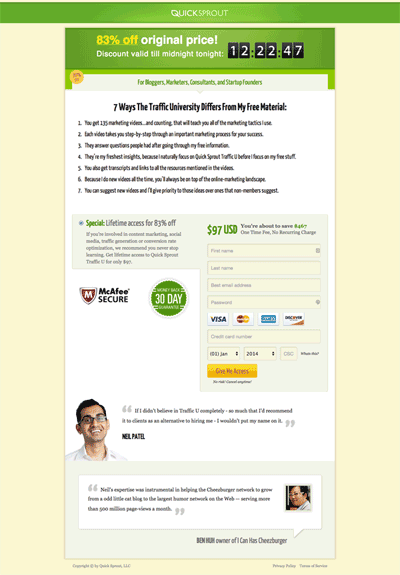
Scarcity bar at the top of the checkout page for Neil Patel's Quicksprout traffic course
The entire daily deals business model is based on scarcity. Sites like Groupon, AppSumo and Living Social get tons of sales every day because they have great deals that only last for a few days.
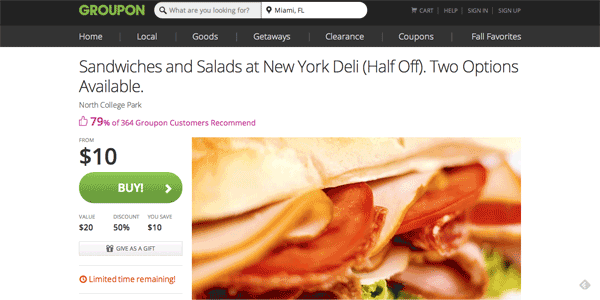
Get a great deal on this delicious sandwich while you still can.
Persuasion Principle #4: Consistency/Commitment
If you can get someone to perform a small action — like filling out a quiz, offering up a piece of information, or doing you a “favor” — they're more likely to perform an even BIGGER action later; an email opt-in, sale or pay more attention to your content.
This is because your brain hates loose ends. Once you've committed to something, your brain needs to see it through to the end, no matter how small or large the commitment is.
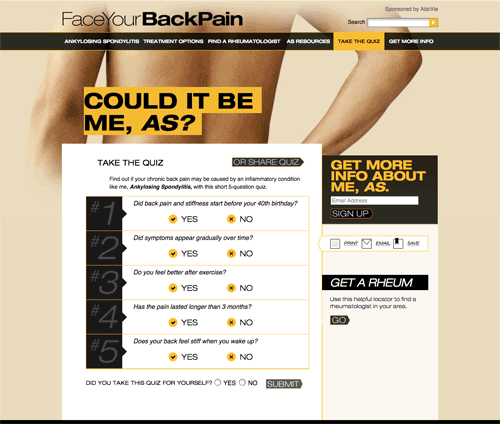
Little actions are often called “micro-commitments”. Get someone to perform a “micro-commitment” now — email opt-in for a free gift, take a quiz, etc. — and they'll be more likely to follow through till the end and buy your product/service.
Persuasion Principle #5: Reciprocity
In Persuasion Cialdini recounts an experiment done at an art museum.
A confederate starts chatting up a stranger, building a bit of rapport. He excuses himself, leaves to buy a Coke, comes back, and then asks the stranger if they'd like to buy raffle tickets.
Situation A: The confederate comes back with just a Coke for himself and asks the stranger if he will buy raffle tickets.
Situation B: The confederate comes back with a Coke for himself plus one for the stranger and then asks if he'll buy a few raffle tickets.
In which situation did the confederate sell more raffle tickets?
The stranger was more likely to buy raffle tickets when the confederate came back with not only a Coke for himself, but also one for the stranger as well.
Why?
Because the stranger has received something for free and now wants to return the good will. It doesn't even matter that the price of the Coke is less than the price of the tickets. It's the principle of the matter.
You're more likely to reciprocate if someone has already done something for you. You innately feel the need to return the favor.
Many expert marketers (Ramit Sethi and Derek Halpern are great examples) make millions of dollars by giving away high-quality content in the form of free eBooks, blog posts, and mini-courses. Since Ramit's courses are so expensive (some up to $10,000) there needs to be a very strong relationship built with the customer before they'll buy.

Once people have read enough of his stuff, taken action, and seen results with the free stuff, they're more likely to want to keep reading his material and maybe buy a course. They might even feel obligated to purchase something since they've gotten so much value from his free material.
Persuasion Principle #6: Social Proof
What's your initial impression of “that guy” at a bar, club, or conference that's always surrounded by beautiful women and/or powerful people?
If you're like most people you think, “Wow. This guy must be really great if he's been able to attract the attention of all these gorgeous women/influential people”
Yet you've probably never even spoke to this person. You have no idea what he's like. He could be a complete idiot for all you know.
So, why would anyone assume something about someone they've never even spoken to?
They assume because another group of people vouch for him by giving him their attention.
This is called “social proof” and is something you should use EVERYWHERE in your marketing.

McDonalds figured out social proof before it was cool.
People are going to buy if they see that other people have already bought and have seen results. People want to do what other people are doing.
A few ways you can highlight that you're in demand is by showing off things like:
- Facebook likes
- Twitter Followers
- Customer brand logos
- Customer testimonials
- Number of installations
- Number of email subscribers
- Celebrity Endorsements
The key to selling anything is by building trust and social proof is the ultimate trust builder.
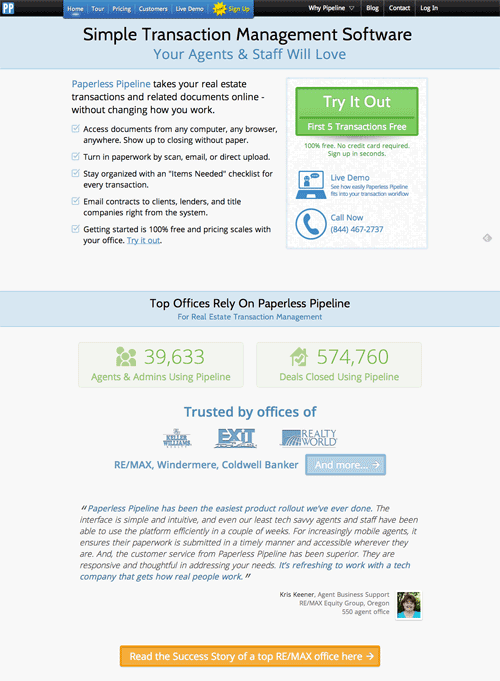
Conclusion
All 6 of these principles should be used throughout your marketing and your landing pages. You're much more likely to see success with cold traffic when you start to focus more on what happens after they click, as opposed to before the click.
Thanks again Mike for another great piece of content.
Regarding “scarcity” — as soon as I see a timer on a page I bail.
To me almost all scarcity is false scarcity. It’s just a manipulative tactic.
If you go to Target looking to buy a blender you don’t see a countdown clock letting you know you only have a certain amount of time to make the purchase. Items “on sale” or clearance are not on a timer either — when the supply is gone then the sale ends. But it’s not time based; it’s demand based.